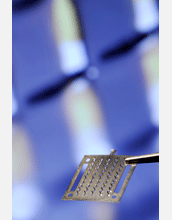Multimedia Gallery
Stainless Steel Microneedles (Image 1)
Stainless Steel Microneedles (Image 1)
An array of stainless steel microneedles, created with a laser-cutting technique.
Researchers at Georgia Institute of Technology and Emory University are studying the use of microneedle arrays as an alternative to traditional hypodermic needles for delivering flu vaccine. The tiny needles are too small to significantly stimulate nerve endings in the skin, so they can be applied without causing pain. Researchers envision that microneedle patches, coated with a powdered form of the vaccine, could be mailed to persons who need the immunization, thus eliminating the need to visit a medical facility. The microneedle arrays can also be used to deliver other drugs and vaccines. Development of the microneedle flu vaccine is funded with two grants from the National Institutes of Health, totaling more than $11.5 million. To learn more about this research, see the George Tech Research News story, "Microneedles: Flu Vaccine in Painless Skin Patches under Development at Emory and Georgia Tech with $11.5 Million in NIH Grants.". (Date of Image: September 2007) [Image 1 of 3 related images. See Image 2.]
Credit: Gary Meek, Georgia Tech
Images and other media in the National Science Foundation Multimedia Gallery are available for use in print and electronic material by NSF employees, members of the media, university staff, teachers and the general public. All media in the gallery are intended for personal, educational and nonprofit/non-commercial use only.
Images credited to the National Science Foundation, a federal agency, are in the public domain. The images were created by employees of the United States Government as part of their official duties or prepared by contractors as "works for hire" for NSF. You may freely use NSF-credited images and, at your discretion, credit NSF with a "Courtesy: National Science Foundation" notation.
Additional information about general usage can be found in Conditions.
Also Available:
Download the high-resolution JPG version of the image. (1.7 MB)
Use your mouse to right-click (Mac users may need to Ctrl-click) the link above and choose the option that will save the file or target to your computer.

